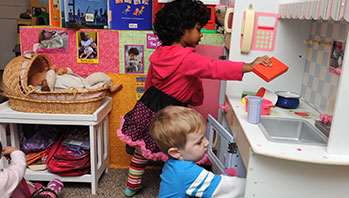- apron
- bowls
- chairs
- leftover plants from the week
- plastic foods
- play knives and cooking utensils
- play stove
- pot
- pretend food
- pretend silverware
- soup pan
- The Ugly Vegetables (book)
- aroma
- soup
- vegetable
MA Standards:
Speaking and Listening/SL.PK.MA.5: Create representations of experiences or stories (e.g., drawings, constructions with blocks or other materials, clay models) and explain them to others.
Speaking and Listening/SL.PK.MA.1: Participate in collaborative conversations with diverse partners during daily routines and play.
Head Start Outcomes:
Logic and Reasoning/Symbolic Representation: Engages in pretend play and acts out roles.
Approaches to Learning/Cooperation: Plans, initiates, and completes learning activities with peers.
Approaches to Learning/Cooperation: Joins in cooperative play with others and invites others to play.
Social Emotional Development/Self-Concept and Self-Efficacy: Demonstrates age-appropriate independence in decision making regarding activities and materials.
PreK Learning Guidelines:
English Language Arts/Language 4: Engage in play experiences that involve naming and sorting common words into various classifications using general and specific language.
Let’s Make Soup

© Commonwealth of Massachusetts, Department of Early Education and Care (Jennifer Waddell photographer). All rights reserved.
Skill Focus: Imaginative Play, Listening and Speaking, Sequencing, Vocabulary
Talk about the delicious soup the girl’s mother made in The Ugly Vegetables. Discuss how the neighbors planted the “special” vegetables in their own garden the following spring. Say, The neighbors learned all about the Chinese vegetables the little girl’s Mom planted. They had never had soup made from those vegetables before.
- Encourage children to make a soup for the group that they have never had before.
- Say, What will you put in your soup? Tell children that it is a make-believe soup and they can use whatever ingredients they want to. Say, But you have to have at least one vegetable in the soup so you can describe where the vegetable aroma is coming from.
Allow children to set the table and invite other children to join in tasting their soup.
Educator Tip: Talk with children about how families from all over the world eat different vegetables and prepare them in different ways, and about the many different types of cooking shows there are that reflect the diversity of foods and dishes people eat.
Adaptation: If children have difficulty naming an ingredient in their soup recipe, prompt with the first phoneme of the word.
